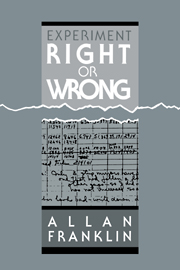Summary
Scientists need no convincing that experiment plays an essential role in science. It provides the basis for theory choice, confirms or refutes hypotheses or theories, and sometimes calls for new theories. These are only a few of its roles and, as Ian Hacking (1983) has pointed out, experiment often has a life of its own. Nevertheless, I called my previous book The Neglect of Experiment (1986). Who was neglecting experiment? Certainly not scientists. I believed then that it was historians, philosophers, and sociologists of science. Even among those who acknowledged the importance of experimental results there tended to be an almost mythological treatment of a few standard exemplary experiments, such as Galileo and the Leaning Tower, Young's double slit interference experiment, and the Michelson-Morley experiment. Actual experiments were rarely discussed.
Fortunately, this is no longer the case. One of the most interesting and exciting trends in history, philosophy, and sociology of science in the 1980s has been the study of and emphasis on actual experiments. Philosophers such as Dudley Shapere (1982), Ian Hacking (1983), Nancy Cartwright (1983), and Robert Ackermann (1985) have used the actual practice of science to analyze and illuminate what good science should be. Historians such as Bruce Wheaton (1983), Peter Galison (1987), and Roger Stuewer (1975) have not only provided us with detailed studies of particular experiments, but have also given us new perspectives on the role of real experiments. Sociologists of science have added to our knowledge by their detailed studies of experiments.
- Type
- Chapter
- Information
- Experiment, Right or Wrong , pp. 1 - 6Publisher: Cambridge University PressPrint publication year: 1990



